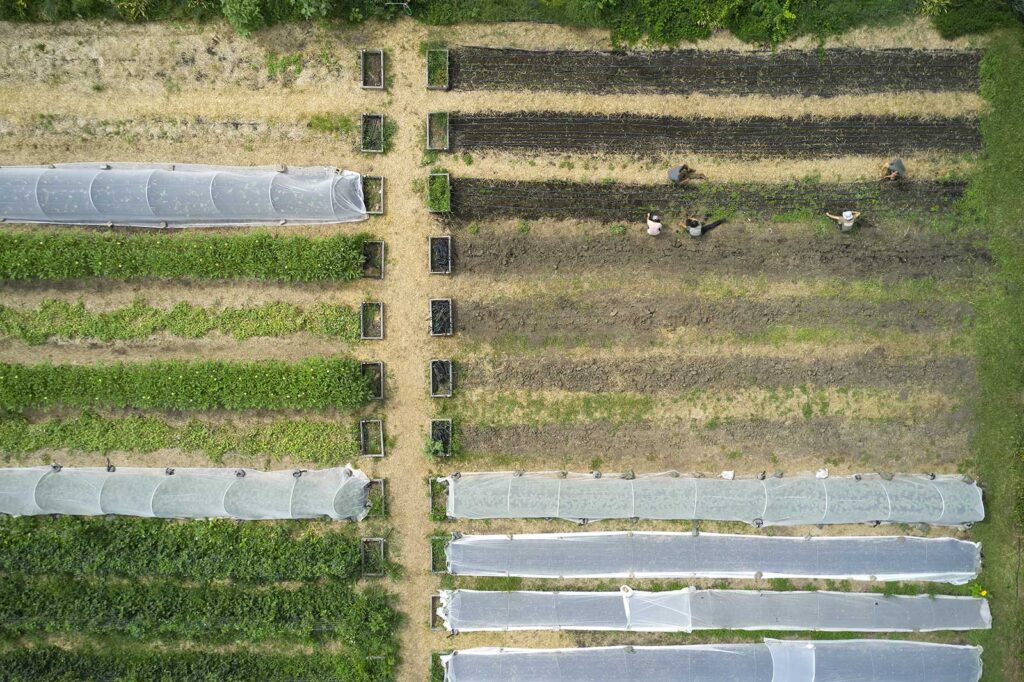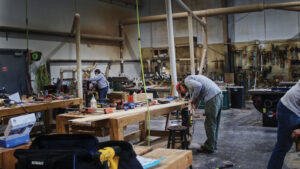The Columbia Center for Urban Agriculture’s Veteran’s Urban Farm Program.
In The Beginning
In 2008, a concerned group of MU students took action to decrease the food waste from campus dining facilities. They formed a student organization, Sustain Mizzou, and initiated a composting program. Subsequently, they took the logical next step and used the compost to start a community garden.
As the organization, and the garden, continued to grow, so did support from the local community, including new partnerships with organizations such as Columbia Public Schools, the Columbia Housing Authority, and Columbia Parks and Recreation. Over the next eight years, the organization gained its nonprofit 501(c)(3) status and became the Columbia Center for Urban Agriculture, using their produce to feed at-risk members of the community through programs such as Planting for the Pantry and PLANTS.
In early 2020, CCUA moved to a new, bigger facility at Columbia’s Agriculture Park, also home to the Columbia Farmers Market. The original garden site, on Smith Street, has continued to serve the community through a recently developed partnership with the Harry S. Truman Memorial Veterans’ Hospital. The Smith Street site became the Veterans Urban Farm.
“There is a need to reach those that are struggling with food insecurity because they may not be willing or able to utilize the food pantry,” says Dustin Cook, manager of the Veterans Urban Farm program. An army veteran himself, Dustin understands all too well the struggles that can accompany transitioning back to civilian life. “One thing I’ve always wanted to do is to help other veterans who have had the same struggles as I’ve had. It is difficult on the best day to make that transition.”
Dustin grew up in the Ozarks, in an area almost entirely affected by rural poverty. He says that gardening was more of a necessity than a leisure activity. He was the first person in his family to graduate from college, where he took classes in environmental biology and studied the concept of sustainability.
Through independent reading on the subjects of gardening and farming, Dustin built his knowledge of the “old-school” agriculture practices of the past. “These were things our grandparents were doing, but [the practices] were left by the wayside by industrial agriculture. I feel reconnected to past generations — I’m sure my great-grandfather used all of these practices with a horse and plow instead of big machines,” he says.
Dustin came to CCUA through the AmeriCorps program in 2019 to work in an outdoor classroom. It was around this time that CCUA was initiating the Veterans Urban Garden program, and Dustin was a prime candidate for the position of manager. “I said: ‘Yes! Absolutely!’ Getting to return to my roots and going back to growing food and providing food for members of the community is very deeply personal to me because that is my background,” shares Dustin.
Giving Back
The Veterans Urban Farm is part of the VA’s transitional work program, which provides the opportunity for veterans to benefit from the therapeutic aspects of outdoor activity and gardening. During their time on the farm, veterans are trained and taught various horticulture-related skills and receive help updating their resume and applying for jobs.
“We see an interesting mix of backgrounds, [from] folks who grew up on farms to participants who have never even grown a houseplant,” Dustin says. “Many have said they plan to continue to garden. But anyone can come and volunteer — you don’t have to be a veteran.”
Aside from the rotation of spring, summer, and fall crops — including root vegetables, tomatoes, berries, potatoes, and greens — the farm also has beehives and chickens. The outdoor classroom and compost site can be utilized by anyone in the community. There are no pesticides, herbicides, fungicides, or artificial fertilizer used. Instead, the program uses compost for fertilizer, and insect netting, BT (Bacillus thuringiensis), or neem oil are used for insect repellent.
Since March 2020, the Veterans Urban Farm has donated more than 20,000 pounds of produce, most of which go directly to veterans via a free produce stand at the VA from 10 a.m. to 12 p.m. every Thursday. Dustin says they also partner with Welcome Home Veterans, Phoenix Programs, and the Food Bank for Central and Northeast Missouri’s Central Pantry. “Everything goes somewhere to someone who needs it,” he says.
Looking to the Future
Dustin also has plans for an unused former classroom garden to be transformed into a 3,000-square-foot, ADA-accessible garden and multi-purpose activity space, which they are actively fundraising for. “This addition will help make this site inclusive for veterans with limited mobility, featuring wide rows and raised beds,” he says.
The Veterans Urban Farm is funded through grants and private donations and includes three full-time staffers: There’s Dustin; assistant manager Dixie Litchard, also a veteran and currently serving reservist; and a revolving AmeriCorps assistant.
“We depend on support from community in terms of donations and volunteers,” Dustin says. “Without them, it would be a really big challenge to accomplish what we do.” New volunteers can visit the volunteer page on the CCUA’s website to sign up and find general information.
Periodically throughout the year (following the guidelines for COVID-19 health and safety), CCUA holds public events on the farm. For Veteran’s Day 2020, there was a drive-up meal giveaway catered by Ozark Mountain Biscuit Co., and on Friday, October 8, 2021, there will be an open house event. “We want people to see what we are doing, how we are serving veterans, and what other organizations are out there so we can educate the community on the programs that are available,” says Dustin.
The CCUA’s overarching mission to combat food insecurity in the community at large is certainly being achieved through The Veterans Urban Farm program. “It serves as an example of what can be done when communities take an active role in supporting a grassroots organization such as this one, and through powerful collaborations with like-minded organizations, such as the VA.”
Dustin says that he finds being able to have a positive impact on the lives of other veterans in Mid-Missouri personally rewarding, and he’s grateful for the opportunity provided by CCUA. “We hope to be a model for how urban spaces can be used to not only produce food sustainably, but to go above and beyond to do so regeneratively, restoring native habitat or rebuilding urban soil as an ecosystem,” he says. “This can be done. We did it here, and it can be done everywhere. Local food is the future.”










